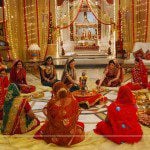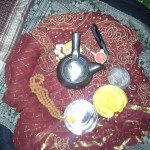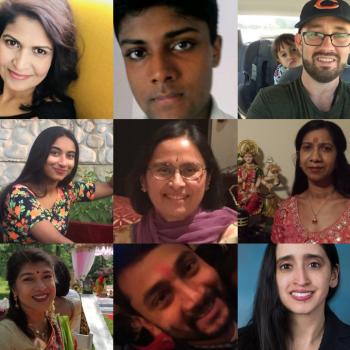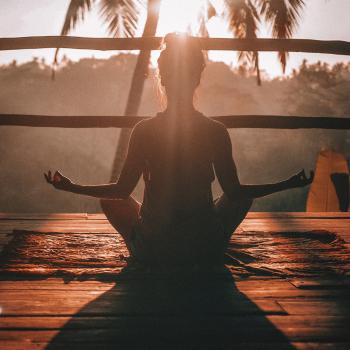I have a new series for you, which is a set of interviews with a variety of young people who are American but have Indian families. I feel like I have a lot in common with the children of immigrants from India. We both are struggling to understand culture and religion that is divorced from its origin. I have the advantage of being assumed to be American which is a pretty shitty thing, in my opinion. I hate that whiteness is seen as purely American and other ethnicities are not. Half my family are recent immigrants so I don’t think I am in any way more American than my peers with Indian families. Yet I have seen that there is a different assumption made about people with other skin colors.
Still, I have gone one way with understanding and incorporating culture and religion and I think it will be of great value to me and to you, my readers, to hear the stories of people who have made other choices on this road.
This first one is from my friend Mahesh…

1) Tell us about you and your family. Were you born in the U.S.? Were your parents? Are they from India or Africa or somewhere else?
I was born in the US and my family was born in India.
2) What religion is your family and would you consider yourself that religion also?
My Mom, Dad, Brother and his wife are all Hindu. I am Buddhist. Many members of my family have chosen different religions such as Christianity and Islam. Overall though, my family can be considered Hindu and Hinduism is how we all connect spiritually.
3) Do you see yourself as a spiritual or religious person?
I am a very religious person. I don’t look at religion as a way to judge people though. I look at religion as a way to better myself and help other people. I think it is up to everyone to find a religion or spirituality which connects with them. When I was young and Hindu, I thought that everyone had to follow a code of conduct and it was society that was supposed to guide you. But when I found Buddhism, I found that religion is really a personal affair. In becoming Buddhist, I just read one story which opened up my life. After reading this story, I found peace and freedom from other peoples perceptions of me and really found my life as completely in my hands. I wish everyone this liberation where ever they can find it (in any religion). After finding this liberation, I also started finding truth in Hinduism and other religions as well. I think spirituality really opens the door for you.
4) What role, if any, does religion play in your life?
Religion is really a personal thing for me. I play a musical instrument and do martial arts. I always try to find what the next step for me is and whether I am able to make that next step or not. The one thing I found in Buddhism is some people can just say that they are the Buddha and try to follow everything he did, but that doesn’t make you a Buddha. You have to be at the level to accept and personally transform yourself with every new action you make rather than blindly and superficially doing actions that you think will instantaneously make you a Buddha. For most of us its a long journey, but it starts with finding out how imperfect you really are.
5) Do you feel any conflict between your American identity and your Indian identity?
When I was growing up, I just thought I was American and that was it. But as I grew older, I realized many people judge me as being Indian. This is strange because for a long time I didn’t know any Indian language, barely knew anything about Hinduism, barely knew anything about India and didn’t have many Indian friends. As time went on I found that although I live in America, I barely associate with anyone who is actually 2nd generation or more American. I didn’t know at the time, but I am actually blessed to have the friendships and associations with so many different cultures and people, but it made me think “what am I doing in America”.
6) If so, which is more important in your life or are they equal?
I think I am American and that is more important. My Indian heritage definitely helps shape my life and provides me with help in many ways, but it is really me blending my American-ness with my Indian-ness.
7) How would you define “culture”?
Thats a tough one. Culture is a way of life. I think it is about values and norms. Its always better to assume a culture than have someone impose the culture on you. Like if a girl were to think that wearing a sari is more conservative and wear it to a ball rather than have her mother say she must wear a sari because it is more conservative and Indian people are conservative.
So culture is really how you take in a massive set of values and apply it to your life. I think culture has many interpretations, so no one really knows what culture truly really is. And culture is always changing, so its hard to pin point what culture really is at a moment.
Extended interviews are available at my subscription blog: http://admin.patheos.com/premium/whitehindu/2013/10/extended-interviews-with-americans-of-indian-ethnicity-mahesh
Additional questions there are:
8) In what ways do you connect to culture and how important is it to you to do so?
9) Do you believe that culture and race are connected?
10) When non-Indian Americans like bindis, Bollywood movies, or om tattoos, how do you feel about it?
11) Do you feel pressures from your family or community to be a certain way?
12) What is your relationship with your family like? How do they respond to your American-ness?
13) What elements of yourself and your history make you most you?
I am really moved by Mahesh’s description of finding a story that freed him from the oppression of worrying what other people think. These sentences really stood out to me: “In becoming Buddhist, I just read one story which opened up my life. After reading this story, I found peace and freedom from other peoples perceptions of me and really found my life as completely in my hands. I wish everyone this liberation where ever they can find it (in any religion)” I also see myself as a very religious person but hopefully don’t use that to judge others!











